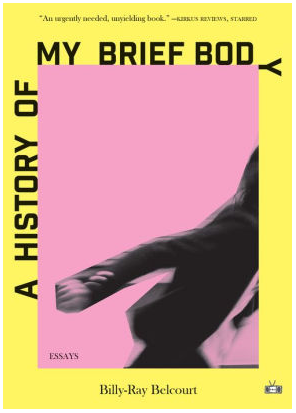Belcourt, Billy-Ray. A History of My Brief Body. Two Dollar Radio. 2020. $15.99. 140 p. PB. 978-1-937512-93-4.
 There are far too few essay collections by LGBTQ+ authors published each year, so an alarm went off when I first heard about A History of My Brief Body, by Billy-Ray Belcourt, a poet of the Driftpile Cree Nation in Alberta, Canada. His writing in this stellar collection is a tool of resistance through which he imbibes lost languages and false histories, digests and absorbs them that he might destroy the systems of oppression exercised over NDNs (his term), a struggle that ultimately helps create joy, love, and hope. Whether exploring personal history; investigating the trauma—the sorrow, grief, and rage—of living in a world that would deny him his humanity; the loneliness inherent in gay hook-up culture; or the necessary battle of reconciling Eurocentric expectations of Native American literature; we are witness to a writer’s fertile mind in action.
There are far too few essay collections by LGBTQ+ authors published each year, so an alarm went off when I first heard about A History of My Brief Body, by Billy-Ray Belcourt, a poet of the Driftpile Cree Nation in Alberta, Canada. His writing in this stellar collection is a tool of resistance through which he imbibes lost languages and false histories, digests and absorbs them that he might destroy the systems of oppression exercised over NDNs (his term), a struggle that ultimately helps create joy, love, and hope. Whether exploring personal history; investigating the trauma—the sorrow, grief, and rage—of living in a world that would deny him his humanity; the loneliness inherent in gay hook-up culture; or the necessary battle of reconciling Eurocentric expectations of Native American literature; we are witness to a writer’s fertile mind in action.
As a queer man, Belcourt sees himself as something of a pariah in the already marginalized NDN society, and this creates many difficulties. Seen through the lens of his culture, his sexuality is a pronounced disavowal of any possible futurity (no biological offspring), and as such, narrowly defined as only a body, located here and now. In the essay “Loneliness in the Age of Grindr” he discusses the “geography of anxiety,” an emotional landscape wherein one’s body is validated or invalidated through anonymous hook-ups, and this further complicated by a trend where certain men desire him simply to fulfill an NDN fetish fantasy. Belcourt touches on a larger theme related to the fragile self-esteem of many gay men whose self-worth is alternately fed and starved by such encounters, on a platform already overwhelmingly populated by emotionally unavailable (read: societally traumatized) men.
“Writing disarrays the world around me,” Belcourt writes in “Notes from an Archive of Injuries,” and in many ways this statement voices his stance as a writer confronting the world. Operating as both cultural critic and literary theorist, he disrupts customary expectations and opens surprising and intriguing avenues of thought, uncovering (and creating) voices silenced and effectively erased through the whitewashing of history. “Please Keep Loving: Reflections on Unlovability,” an essay that questions the verity of suicide prevention programs in a society where nothing is done to address the underlying social problems that form the type of despair that leads one to contemplate suicide, explores this idea further. Here Belcourt suggests “making new forms of collective NDN life” by wresting their lives from the white imagination and all systems of social oppression and creating a worthwhile and truly authentic life on their own terms. I believe the essays in A History of My Brief Body are meant to be a step towards the creation of those new forms.
I found this book an incredible read. I recommend it to readers who appreciate essays, Native American literature, and good writing in general. It would be appropriate for public and academic libraries seeking nonfiction works by diverse LGBTQ+ writers.
Andrew T. Powers
University of Michigan
